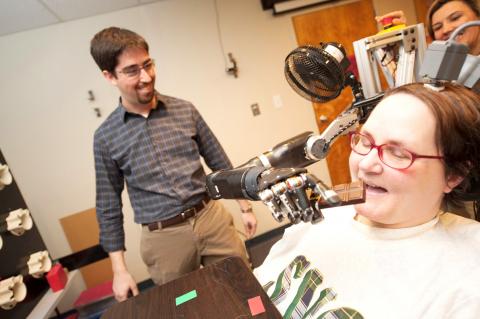A woman who is paralyzed from the neck down has stunned doctors with her extraordinary skill at using a robotic arm that is controlled by her thoughts alone.
The 52-year-old patient, called Jan, lost the use of her limbs more than 10 years ago to a degenerative disease that damaged her spinal cord. The disruption to her nervous system was the equivalent to having a broken neck.
However, in training sessions at Pittsburgh University, doctors found she quickly learned to make fluid movements with the brain-controlled robotic arm, reaching levels of performance never seen before.

Photo: Reuters
Doctors recruited the woman to test a robotic arm that is controlled by a new kind of computer program that translates the natural brain activity used to move our limbs into commands to move the robotic arm.
The design is intended to make the robotic arm more intuitive for patients to use. Instead of having to think where to move the arm, a patient can simply focus on the goal, such as “pick up the ball.”
Several groups around the world are developing so-called brain-machine interfaces to control robotic arms and other devices, such as computers, but none have achieved such impressive results.
Writing in the Lancet, researchers said Jan was able to move the robotic arm back, forward, right, left and up and down only two days into her training. Within weeks she could reach out and change the position of the hand to pick up objects on a table, including cones, blocks and small balls, and put them down at another location.
“We were blown away by how fast she was able to acquire her skill, that was completely unexpected,” said Andrew Schwartz, professor of neurobiology at Pittsburgh University. “At the end of a good day, when she was making these beautiful movements, she was ecstatic.”
To wire the woman up to the arm, doctors performed a four-hour operation to implant two tiny grids of electrodes, measuring 4mm on each side, into Jan’s brain. Each grid has 96 little electrodes that stick out 1.5mm. The electrodes were pushed just beneath the surface of the brain, near neurons that control hand and arm movement in the motor cortex.
Once the surgeons had implanted the electrodes, they replaced the part of the skull they had removed to expose the brain. Wires from the electrodes ran to connectors on the patient’s head, which doctors could then use to plug the patient into the computer system and robotic arm.
Before Jan could use the arm, doctors had to record her brain activity imagining various arm movements. To do this, they asked her to watch the robotic arm as it performed various moves and got her to imagine moving her own arm in the same way.
While she was thinking, the computer recorded the electrical activity from individual neurons in her brain.
Neurons that control movement tend to have a preferred direction, and fire their electrical pulses more frequently to perform a movement in that direction.
“Once we understand which direction each neuron likes to fire in, we can look at a larger group of neurons and figure out what direction the patient is trying to move the arm in,” Schwartz said.

A new online voting system aimed at boosting turnout among the Philippines’ millions of overseas workers ahead of Monday’s mid-term elections has been marked by confusion and fears of disenfranchisement. Thousands of overseas Filipino workers have already cast their ballots in the race dominated by a bitter feud between President Ferdinand Marcos Jr and his impeached vice president, Sara Duterte. While official turnout figures are not yet publicly available, data from the Philippine Commission on Elections (COMELEC) showed that at least 134,000 of the 1.22 million registered overseas voters have signed up for the new online system, which opened on April 13. However,

EUROPEAN FUTURE? Albanian Prime Minister Edi Rama says only he could secure EU membership, but challenges remain in dealing with corruption and a brain drain Albanian Prime Minister Edi Rama seeks to win an unprecedented fourth term, pledging to finally take the country into the EU and turn it into a hot tourist destination with some help from the Trump family. The artist-turned-politician has been pitching Albania as a trendy coastal destination, which has helped to drive up tourism arrivals to a record 11 million last year. US President Donald Trump’s son-in-law, Jared Kushner, also joined in the rush, pledging to invest US$1.4 billion to turn a largely deserted island into a luxurious getaway. Rama is expected to win another term after yesterday’s vote. The vote would

ALLIES: Calling Putin his ‘old friend,’ Xi said Beijing stood alongside Russia ‘in the face of the international counter-current of unilateralism and hegemonic bullying’ Chinese President Xi Jinping (習近平) yesterday was in Moscow for a state visit ahead of the Kremlin’s grand Victory Day celebrations, as Ukraine accused Russia’s army of launching air strikes just hours into a supposed truce. More than 20 foreign leaders were in Russia to attend a vast military parade today marking 80 years since the defeat of Nazi Germany in World War II, taking place three years into Russia’s offensive in Ukraine. Putin ordered troops into Ukraine in February 2022 and has marshaled the memory of Soviet victory against Nazi Germany to justify his campaign and rally society behind the offensive,

Myanmar’s junta chief met Chinese President Xi Jinping (習近平) for the first time since seizing power, state media reported yesterday, the highest-level meeting with a key ally for the internationally sanctioned military leader. Senior General Min Aung Hlaing led a military coup in 2021, overthrowing Myanmar’s brief experiment with democracy and plunging the nation into civil war. In the four years since, his armed forces have battled dozens of ethnic armed groups and rebel militias — some with close links to China — opposed to its rule. The conflict has seen Min Aung Hlaing draw condemnation from rights groups and pursued by the